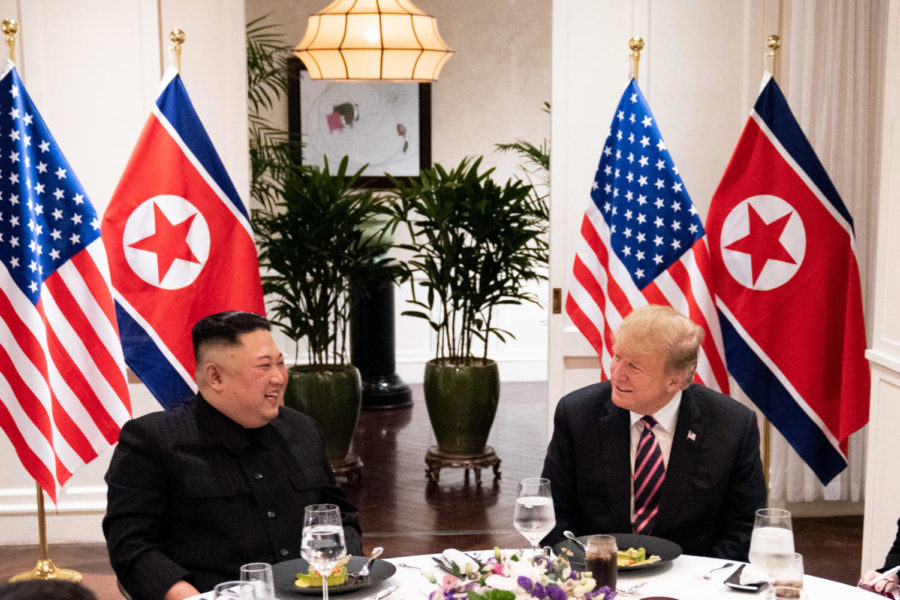Michael Cohen testifies in front of Congress
Michael Cohen, President Donald Trump’s former lawyer, testified in front of the House Oversight Committee on Wednesday, Feb. 27. Cohen claimed that Trump had directed him to lie about hush money payments, that Trump had lied to the public about business interests in Russia, and accused him of an overall pattern of deceit and criminality.
For seven hours, Cohen expressed his remorse for both his actions and loyalty to Trump in front of the committee.
“It seems unbelievable that I was so mesmerized by Donald Trump that I was willing to do things for him that I knew were absolutely wrong,” Cohen said. “I regret the day I said ‘yes’ to Mr. Trump. I regret all the help and support I gave him along the way.”
Cohen’s testimony furthered the already deep partisan lines that have surrounded the Trump presidency. Republicans on the committee such as Rep. Jim Jordan questioned Cohen’s overall motives and character. Democrats used their time to press Cohen on matters regarding Trump and alleged illegal activity.
“Is there any other wrongdoing or illegal act that you are aware of regarding Donald Trump that we haven’t yet discussed today?” Rep. Raja Krishnamoorthi of Illinois asked Cohen.
Cohen also faces a prison sentence of three years for tax evasion, bank fraud, lying to Congress, and orchestrating hush-money payments, in a separate case from federal court.
Trump-Kim summit ends with no resolution
President Trump and Kim Jong-Un met for a summit in Vietnam this week. The summit ended abruptly, with neither side reaching an agreement about disarmament or easing tensions on the Korean Peninsula.
According to Trump, Kim had offered to dismantle the North’s most important nuclear facility if the United States lifted the harsh sanctions imposed on North Korea, but would not commit to doing the same for other elements of its weapons program. For Trump, that position served to be a dealbreaker.
“It was about the sanctions. Basically, they wanted the sanctions lifted in their entirety, but we couldn’t do that,” Trump said.
The end to the negotiations leaves both sides exactly where they first started. The United States has insisted that it will end sanctions against North Korea once North Korea can verify that its nuclear program has been dismantled.
Both North Korea and the United States offered conflicting accounts of how the summit ended. The North Korean official Korean Central News Agency reported that “Kim and Trump agreed to keep in close touch with each other” and “continue productive dialogues.”
U.S. officials such as Secretary of State Mike Pompeo said, “When you are dealing with a country that is of the nature of North Korea, it is often the case that only the most senior leaders have the capacity to make those important decisions.”
Gun Reform Bill passes in the House of Representatives
On Wednesday, the House of Representatives passed one of the most significant gun control measures in more than two decades.
The Bipartisan Background Checks Act of 2019, or HR 8, would extend the period federal authorities have to complete a background check before a gun sale can go through. Currently, if a background check isn’t finalized in three days, the transaction can automatically proceed.
The legislation mandates background checks to be performed on all gun sales. This includes purchases of firearms made privately, such as online or at a gun show.
The legislation passed largely on party lines, with a vote of 240 to 190. Eight Republicans voted for the bill, and two Democrats, Jared Golden of Maine and Collin Peterson of Minnesota, voted against it. The bill was sponsored by a bipartisan duo of Reps. Mike Thompson, a California Democrat, and Peter King, a New York Republican.
Supporters of the bill included many gun violence prevention advocacy groups.
In a statement, John Feinblatt, president of the anti-gun violence group, Everytown for Gun Safety, praised the bill
“We applaud Speaker Pelosi and the bipartisan coalition of House members who supported this bill for stepping up and doing their part to close the giant and deadly loopholes in America’s background checks law,” Feinblatt said.
The bill’s detractors included many congressional Republicans and gun rights groups.
Chris Cox, executive director of the National Rifle Association’s Institute for Legislative Action, issued a statement, calling the background check bill “extreme,” adding it will “make criminals out of law-abiding Americans.”
Next, the bill will head to the Senate for a vote. If it passes in the Senate, it then goes to the President’s desk to be signed into law or vetoed.












